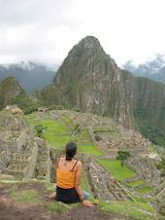Originally posted June 19,2007
Too many people I know rely on bottled water to drink- not just drink it- but rely on it. Sure I drink bottled water too- especially when I travel to certain regions of this planet- but for the most part I reuse my plastic bottles by filling them up with tap water. Why? Because it’s there, it allows me to drink a lot more water/day than I would if I had to rely on bottled water, I save tons of money, and really there’s nothing wrong with tap water. Perhaps it even makes me healthier because I am adapting to my local enviroment by drinking from my local source.
People complain about taste, pollution, etc. Bottled water has a taste too- but people get used to that. I remember the first time I tasted dark chocolate I did not like it because it was not as smooth and sweet as milk chocolate. But slowly and quickly my taste buds adapted and now I 100% prefer dark chocolate to milk chocolate- & dark choc is better for us than milk choc. Bottled water has taste based on the source of the water and the filter used. On top of that, bottled water sits on store shelves and the plastic slowly leeches into the water- which also gives it a taste. Soft plastic have tons of xeno-estrogens which are harmful for humans (but that is another discussion).
We are told that tap water is bad for us...but why is it so bad that we should not drink it? It is not full of bacteria, parasites, and pesticides like in some poverty stricken countries. This bottled water craze has only picked up in the last 10 years. My grandparents and parents seem fine. I was fine for the first 2 decades of my life. And actually the EPA has stronger regulation over water treatment, pollution, and contamination now than it did decades ago. Perhaps we should all be walking around with highly filtered masks because we pollute our air and I am certain that we ingest more air into our bodies per day than water. Is tap water that bad for us or are we all buying into a myth?
So much waste is created by the use of bottled water- think of the landfills full of plastic. On top of that, think of the gas and oil that is needed to 1) produce the plastic bottles 2)ship the bottles from maine, fiji, or wherever the pure natural spring source is to your local grocery store. Aren’t we at war right now based on oil? Do we need to encourage our dependance on oil by refusing to drink the highly filtered highly regulated water than comes out of our local well sources just because we don’t like the taste?
So many people in this world are suffering from lack of resources- some people don’t have a source or access to drinkable water. Perhaps we should be grateful that we do, take full advantage of it, and save the bottled water for times of necessity rather than being greedy and using up the world’s resources for ourselves. Let’s stop pouring the resources down the drain.
Check out this article from the Union of Concerned Scientists that reminded me of my beliefs...Ok, I need to go dig out my nalgene bottle and put it into use again.
Is Bottled Water Better?
June 2007
Bottled water manufacturers’ marketing campaigns capitalize on isolated instances of contaminated public drinking water supplies by encouraging the perception that their products are purer and safer than tap water. But the reality is that tap water is actually held to more stringent quality standards than bottled water, and some brands of bottled water are just tap water in disguise. What’s more, our increasing consumption of bottled water—more than 22 gallons per U.S. citizen in 2004 according to the Earth Policy Institute—fuels an unsustainable industry that takes a heavy toll on the environment.
Environmental Impact
Fossil fuel consumption. Approximately 1.5 million gallons of oil—enough to run 100,000 cars for a whole year—are used to make plastic water bottles, while transporting these bottles burns thousands more gallons of oil. In addition, the burning of oil and other fossil fuels (which are also used to generate the energy that powers the manufacturing process) emits global warming pollution into the atmosphere.
Water consumption. The growth in bottled water production has increased water extraction in areas near bottling plants, leading to water shortages that affect nearby consumers and farmers. In addition to the millions of gallons of water used in the plastic-making process, two gallons of water are wasted in the purification process for every gallon that goes into the bottles.
Waste. Only about 10 percent of water bottles are recycled, leaving the rest in landfills where it takes thousands of years for the plastic to decompose.
The Simple (and Cheaper) Solution
The next time you feel thirsty, forgo the bottle and turn to the tap. You’ll not only lower your environmental impact but also save money—bottled water can cost up to 10,000 times more per gallon than tap water. And because the U.S. Environmental Protection Agency’s standards for tap water are more stringent than the Food and Drug Administration’s standards for bottled water, you’ll be drinking water that is just as safe as, or safer than, bottled.
If, however, you don’t like the taste of your tap water or are unsure of its quality, you can buy a filter pitcher or install an inexpensive faucet filter to remove trace chemicals and bacteria. If you will be away from home, fill a reusable bottle from your tap and refill it along the way; travel bottles with built-in filters are also available. Finally, limit your bottled water purchases for those times when you’re traveling in countries where water quality is questionable.
http://www.earth-policy.org/Up
dates...te51.htm
.
Subscribe to:
Post Comments (Atom)


No comments:
Post a Comment